
Color, 1968, 136m.
Directed by Roman Polanski
Starring Mia Farrow, John Cassavetes, Ruth Gordon, Sydney Blackmer, Ralph Bellamy, Maurice Evans
Criterion (Blu-Ray & DVD) (US RA/R1 HD/NTSC), Paramount (DVD) (US, UK, many other countries) / WS (1.85:1) (16:9)
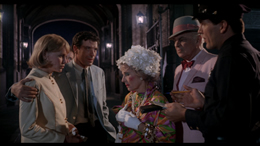 While the world seemed to be turning upside down with upheaval in 1968, the American horror film was also hurled kicking and screaming into the modern age with two films, one from a major studio and the other a scrappy indie: Rosemary's Baby and Night of the Living Dead. Both films took advantage of the sudden chaos of the movie ratings system to deliver previously taboo content on the screen, though Romero's film did so in a far more aggressive manner with so
While the world seemed to be turning upside down with upheaval in 1968, the American horror film was also hurled kicking and screaming into the modern age with two films, one from a major studio and the other a scrappy indie: Rosemary's Baby and Night of the Living Dead. Both films took advantage of the sudden chaos of the movie ratings system to deliver previously taboo content on the screen, though Romero's film did so in a far more aggressive manner with so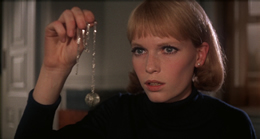 ciety literally feeding on itself in front of the camera. However, Polish director Roman Polanski delivered an equally subversive but more socially acceptable bit of provocation by faithfully adapting a successful novel by Ira Levin, using artistic skill and studio gloss to give audiences a tale of urban paranoia and female anxiety that still remains unsurpassed among cinematic studies of the psychological colliding with the supernatural.
ciety literally feeding on itself in front of the camera. However, Polish director Roman Polanski delivered an equally subversive but more socially acceptable bit of provocation by faithfully adapting a successful novel by Ira Levin, using artistic skill and studio gloss to give audiences a tale of urban paranoia and female anxiety that still remains unsurpassed among cinematic studies of the psychological colliding with the supernatural.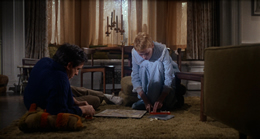 The origins of Rosemary's Baby have become familiar to horror fans, and it's tantalizing to imagine how differently this could have turned out in different hands. Producer William Castle, the mastermind behind such gimmicky favorites as The Tingler and House on Haunted Hill, snagged the option on the Levin novel before it was published and planned to direct it himself. However, the new Paramount VP in charge of production, Robert Evans, had other ideas and insisted on Polanski, who had made a splash in Europe with such films as Repulsion and Knife in the Water. Castle (who has a great cameo in the finished film) relented when Polanski agreed that the book should be left intact as much as possible, and after several alternate casting possibilities, Peyton Place TV actress Farrow was given her big break. The result helped turn Paramount into one of the most influential studios going into the next decade and kicked off a spate of mainstream literary horror films ranging from the sublime (The Exorcist) to the ridiculous (The Mephisto Waltz). Rumors also began to surround the film well after its release, particularly with s
The origins of Rosemary's Baby have become familiar to horror fans, and it's tantalizing to imagine how differently this could have turned out in different hands. Producer William Castle, the mastermind behind such gimmicky favorites as The Tingler and House on Haunted Hill, snagged the option on the Levin novel before it was published and planned to direct it himself. However, the new Paramount VP in charge of production, Robert Evans, had other ideas and insisted on Polanski, who had made a splash in Europe with such films as Repulsion and Knife in the Water. Castle (who has a great cameo in the finished film) relented when Polanski agreed that the book should be left intact as much as possible, and after several alternate casting possibilities, Peyton Place TV actress Farrow was given her big break. The result helped turn Paramount into one of the most influential studios going into the next decade and kicked off a spate of mainstream literary horror films ranging from the sublime (The Exorcist) to the ridiculous (The Mephisto Waltz). Rumors also began to surround the film well after its release, particularly with s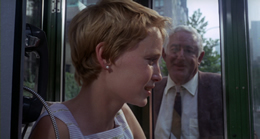 uch tragic events as the murder of Polanski's wife, Sharon Tate, at the hands of the Manson family, the death of young composer Krzysztof Komeda (a brilliant jazz musician who had scored all of Polanski's films through this one), and even the assassination of John Lennon outside the Dakota building where this was filmed. That said, as creepy as the film is, it's also darkly funny, too. Gordon's Oscar-winning performance is still a thing of daffy but sinister beauty, and she's aided by a sterling supporting cast including familiar faces like twitchy noir favorite Elisha Cook, Jr., brilliant comic actress Patsy Kelly (who gets some of the film's best throwaway moments), a very young Charles Grodin as a possibly helpful young doctor, an uncredited verbal cameo by Tony Curtis, and even D'Urville Martin before he went on to blaxploitation immortality in Dolemite and Hell Up in Harlem.
uch tragic events as the murder of Polanski's wife, Sharon Tate, at the hands of the Manson family, the death of young composer Krzysztof Komeda (a brilliant jazz musician who had scored all of Polanski's films through this one), and even the assassination of John Lennon outside the Dakota building where this was filmed. That said, as creepy as the film is, it's also darkly funny, too. Gordon's Oscar-winning performance is still a thing of daffy but sinister beauty, and she's aided by a sterling supporting cast including familiar faces like twitchy noir favorite Elisha Cook, Jr., brilliant comic actress Patsy Kelly (who gets some of the film's best throwaway moments), a very young Charles Grodin as a possibly helpful young doctor, an uncredited verbal cameo by Tony Curtis, and even D'Urville Martin before he went on to blaxploitation immortality in Dolemite and Hell Up in Harlem.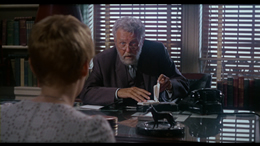 The brilliant but tricky cinematography by William Frayker, a combination of soft lighting and vibrant colors, has made this a challenging film for home video in numerous incarnations, ranging from borderline foggy TV broadcasts to smudgy VHS and laserdiscs. The DVD from Paramount wasn't bad and probably handled it about as ell as standard def could handle, but the Criterion Blu-Ray (with a DVD reissue timed to coincide with it) is easily the way to go. The film is very bright for the most part (a handful of key scenes excepted) which makes it more sleek and less grain-riddled than many of its peers, so the 1080p transfer mainly benefits from focusing many small details in the often busy frame and solidifying those bold reds, pinks, and baby blues that often bled a bit before. The original DVD contained a vintage making-of featurette called "Mia and Roman" as well as a modest new one with Evans, Farrow, and production designer Richard Sylbert (for some reason the atmospheric theatrical trailer has never been on video in any format),
but that's been discarded here in favor of an excellent new 46-minute featurette, "Remembering Rosemary's Baby," in which Evans, Farrow, and Polanski recount the story of the film's creation from discovering the novel to the completion of filming. Farrow is understandably proud of the role and considers it her best, and she supplies some of the best moments in general, too, as she recalls her marriage to Frank Sinatra dissolving due to her refusal to abandon the production. All of them are candid about Polanski's deteriorating rapport with Cassavetes during filming, too, and they go into detail praising the crew in all aspects ranging from the lensing to the production design. It's a very absorbing and fast-paced companion piece well worth watching, with some nifty behind-the-scenes footage (some from that earlier making-of short) included as well. Next up is a 20-minute audio interview with Levin recorded for New York and Company in 1997 to coincide with the release of his disastrous sequel, but thankfully the discussion is more about the original book and some of his other pivotal works, especially the stage hit Deathtrap. It's always fun to listen to the master thriller writer dissecting his work, and his vocal displeasure with some of the other adaptations of his work is interesting to hear, too (including his mixed reaction to the first film of The Stepford Wives). Finally comes the biggest extra of the bunch, the 70-minute 2012 Polish documentary Komeda, Komeda, a loving look at the brilliant composer complete with a wealth of archival material and recollections from both Polanski and Komeda's family and friends. Also included is a liner notes booklet containing a solid new essay by Ed Park, a reprint of Levin's 2003 afterword to the novel (in which he expresses some possible guilt about influencing the extreme religious fundamentalism that's been plaguing society in the following decades), and some brief but fascinating unpublished material for the book including a floor plan drawing and two character bios. Still one of the best horror films ever made, this is one you really can't afford to miss.
The brilliant but tricky cinematography by William Frayker, a combination of soft lighting and vibrant colors, has made this a challenging film for home video in numerous incarnations, ranging from borderline foggy TV broadcasts to smudgy VHS and laserdiscs. The DVD from Paramount wasn't bad and probably handled it about as ell as standard def could handle, but the Criterion Blu-Ray (with a DVD reissue timed to coincide with it) is easily the way to go. The film is very bright for the most part (a handful of key scenes excepted) which makes it more sleek and less grain-riddled than many of its peers, so the 1080p transfer mainly benefits from focusing many small details in the often busy frame and solidifying those bold reds, pinks, and baby blues that often bled a bit before. The original DVD contained a vintage making-of featurette called "Mia and Roman" as well as a modest new one with Evans, Farrow, and production designer Richard Sylbert (for some reason the atmospheric theatrical trailer has never been on video in any format),
but that's been discarded here in favor of an excellent new 46-minute featurette, "Remembering Rosemary's Baby," in which Evans, Farrow, and Polanski recount the story of the film's creation from discovering the novel to the completion of filming. Farrow is understandably proud of the role and considers it her best, and she supplies some of the best moments in general, too, as she recalls her marriage to Frank Sinatra dissolving due to her refusal to abandon the production. All of them are candid about Polanski's deteriorating rapport with Cassavetes during filming, too, and they go into detail praising the crew in all aspects ranging from the lensing to the production design. It's a very absorbing and fast-paced companion piece well worth watching, with some nifty behind-the-scenes footage (some from that earlier making-of short) included as well. Next up is a 20-minute audio interview with Levin recorded for New York and Company in 1997 to coincide with the release of his disastrous sequel, but thankfully the discussion is more about the original book and some of his other pivotal works, especially the stage hit Deathtrap. It's always fun to listen to the master thriller writer dissecting his work, and his vocal displeasure with some of the other adaptations of his work is interesting to hear, too (including his mixed reaction to the first film of The Stepford Wives). Finally comes the biggest extra of the bunch, the 70-minute 2012 Polish documentary Komeda, Komeda, a loving look at the brilliant composer complete with a wealth of archival material and recollections from both Polanski and Komeda's family and friends. Also included is a liner notes booklet containing a solid new essay by Ed Park, a reprint of Levin's 2003 afterword to the novel (in which he expresses some possible guilt about influencing the extreme religious fundamentalism that's been plaguing society in the following decades), and some brief but fascinating unpublished material for the book including a floor plan drawing and two character bios. Still one of the best horror films ever made, this is one you really can't afford to miss.